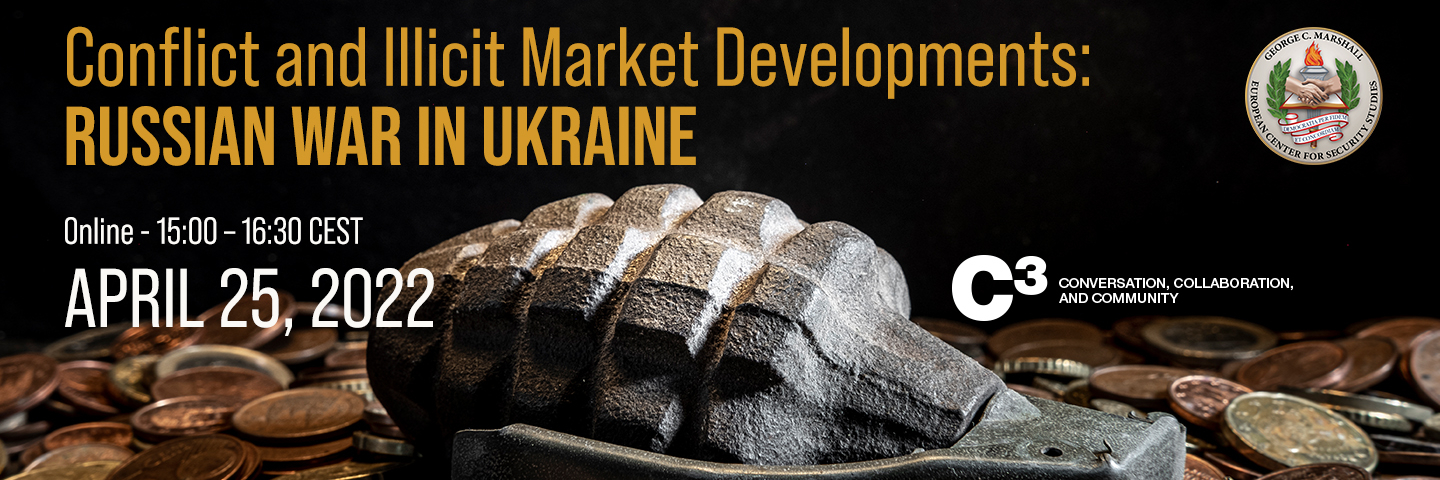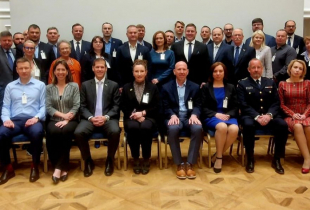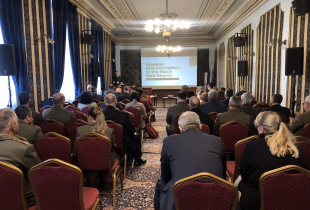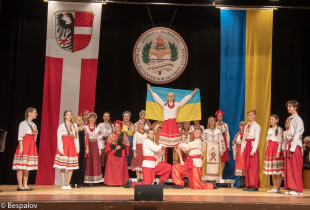
Conflict and Illicit Market Developments: The Russian Invasion and the Future of Ukraine
Introduction
The George C. Marshall European Center for Security Studies (GCMC) hosted a hybrid panel discussion on Apr. 25 to begin a conversation about the relationship between conflicts and illicit markets and how it applies to the current conflict in Ukraine. Around 50 participants from 30 different countries joined the event, held under Chatham House rule at the George C. Marshall Research Library. The panel was part of the C3 Faculty Seminar series, which encourages Conversation, Collaboration, and Community among experts about global security challenges.
The event was moderated by Dr. Cüneyt Gürer, professor of Transnational Security Studies at the GCMC, whose area of expertise covers countering transnational organized crime (CTOC), transnational and comparative security issues/policies, political regimes and security, non-state actors and security and conflict and human displacement. The speakers were Dr. Jay Albanese, professor at the Virginia Commonwealth University, expert in organized crime and corruption, professional ethics and transnational crime, and author and editor of 20 books on organized crime, ethics, corruption, transnational crime, and criminal justice; Dr. Tova Norlén, professor of counterterrorism and international security studies at the GCMC and academic advisor to the Program on Terrorism and Security Studies, with research exploring counterterrorism, ethnic and religious extremism, territorial conflict and intractability, and fragility and resilience to conflict risk factors; and Dr. Graeme Herd, Professor of Transnational Security Studies and Chair of the Research and Policy Analysis Department, expert in Putin’s operational code, Russian strategic culture, Russian foreign and security policy, and Russian strategic behavior.
This event focused on the connection between the shifting power structures created by the war and illicit market opportunities that can threaten Ukraine’s security and stability during the current Russian invasion and post-war phase. The priority for Ukraine after the Russian invasion has naturally been to deter Russian aggression and defend its territory. However, it is worth noting the opportunities that shifting governance structures both during and after the war could create for organized criminal actors who seek to make financial profit. Strengthened illicit markets might undermine Ukraine’s success during the war and have negative effects on the country’s post-war recovery. Previous research and analysis on contemporary conflict and war have highlighted the intensified competition between non-state actors for power and control over lucrative resources. These actors often establish illicit market structures during wartime that threaten the future of the country where the conflict took place. There are three types of illicit markets: the trade of illicit goods (such as drugs and arms), the trade of illicit services (such as human trafficking, forced labor, or protection), and the infiltration of criminal actors into government and businesses.
By focusing on the illicit market opportunities, and how Russia could use these as a form of grey zone warfare against Ukraine, this event highlighted the risks of such developments by evaluating the current situation on the ground. Experts assessed the threat level by highlighting any red flags that might pose a long-term threat to Ukraine. Conflict analysis has shown that there is a direct correlation between conflict and political fragility. The event aims to outline Ukraine’s vulnerability to such risk, and generate recommendations that can help Ukraine tackle post-war reconstruction more effectively.
Key takeaways from the panel
Illicit markets are globally connected and there is a significant relationship between war and illicit market creation and cluster in certain regions of the world, at the juncture of historic trade routes and in accessible locations that geographically link major markets. While geography provides an important explanation why these markets occur in particular places, these locations are strengthened both by the “demand” and “supply” side of economics. The supply side is strengthened through the opportunities that criminal actors see in those markets and the availability of illicitly traded goods. The demand side of those markets are strengthened by the increased pressure for illicit goods both externally and internally, i.e., from the destination or external “customer” side as well as from actors within the illicit market that operate through illicit channels for their own gain. War changes the priorities of state institutions and weakens the state’s capacity to provide certain goods and services—including basic necessities to the civilian population—thus creating opportunities for illicit market actors to fill the gap. Illicit markets during war do not only include the trade in illicit goods or resources, but can also include the trade in licit goods and in everyday necessities through illicit channels.
Conflict and organized crime have a symbiotic relationship: war/conflict can cause the emergence of illicit markets but violence can also result from those markets. Because of the inherent interest that criminal actors and non-state groups have in maintaining control over revenues that they gain from illicit market activities during wartime, strong illicit markets and organized crime have shown to prolong conflict and intensify violence.
In order to defend the country against Russian aggression, Ukrainian institutions and governance structures had to shift away from regular peacetime activities. Conflict naturally weakens a state’s regulatory capacity as it turns its resources elsewhere and reduces the capability to monitor and combat criminal enterprises. Organized crime networks exploit the increased opportunities created from a weakened regulatory environment, building structures and networks that replace it. Due to the limited capacity of Ukrainian institutions during the war and the opportunities it may create for organized criminal groups, the international community, and Western policy makers in particular, should consider developing viable counter-measures that can help limit the emergence of illicit markets.
However, the Ukraine-Russia case also provides some evidence to show that Ukraine may be different, perhaps as a result of the inter-state character of the war and the undisputable one-sided nature of the Russian aggression. The assumptions that the war has led to a weakened regulatory environment that will increase opportunities for organized crime, intensify competition for illicit extraction of lucrative natural resources, and allow the extortion of the civilian population, has somewhat been turned on its head, at least in the part of Ukraine controlled by the Zelensky government. The panelists noted that while there were already strong criminal networks operating in Ukraine before the Russian invasion, the conflict may not have significantly strengthened illicit markets in the areas controlled by the Ukrainian army due to the strengthened performance legitimacy of the wartime government under Zelensky. While the Russian government has also seen a rise in its legitimacy at home, the Donbass region may be where the original assumptions have proved correct and where we indeed will see increased opportunities for criminal networks.
All protracted conflicts where power structures either shift or are contested develop what experts call a “war economy,” where both criminal groups and civilians are dependent on using illicit channels for everyday transactions, and where civilians may be required to rely on armed groups or criminal actors for their survival. The devastating effects from the conflict on the ground in Ukraine are no exception and the developing war economy will inevitably strengthen illicit market opportunities. If the Ukrainian war economy becomes entrenched there is a risk that it transfers into the post-conflict phase, in the form of a “shadow economy,” where organized criminal and non-state armed groups rely on wartime patterns to control the market and subvert political elites.
In addition, the competition for resources and illicitly traded goods is intensified during a wartime economy because of the nature of the armed groups that participate in hostilities. These groups—whether terrorist groups, insurgents, government militias, or other non-state actors—are politically motivated with specific aims related to political and geographic control. While criminal groups chose their operations due to the “supply side” of opportunities, politically motivated groups are largely constrained to the location of the political or geographic entity for which they fight. This creates a crowded marketplace where both politically and criminally motivated actors compete for resources, in effect strengthening the illicit market.
Russia’s pre-war strategy of using organized crime networks as a grey zone tactic in a larger irregular warfare campaign aimed to compromise and weaken Ukraine has continued, especially in the regions that have been occupied by Russian forces. This shows that the larger political and societal context surrounding the emergence of illicit market and its most powerful actors is important for trying to understand how to counter the threats arising from illicit markets. Russian control through aggregated criminality in the Donbas region, as well as in other Russian enclaves like South Ossetia and Transnistria, inevitably leads to the strengthening of both demand and supply factors that lead to the expansion of illicit markets. While organized crime is typically considered largely a law-enforcement problem, the corruption of both political and economic structures of a state by powerful illicit networks tied to another state may require a much wider, whole-of-society approach to prevention. Considering that Ukraine has already been targeted by Russian destabilization campaigns in the past, the international community should support Ukraine by providing assistance that can limit criminal infiltration into key sectors, as well as by closely monitoring and de-criminalizing (or integrating into its armed forces) non-state armed groups that are fighting against Russia.
Organized crime structures and criminal networks are driven by similar principles as those actors who participate in licit market structures. Their main objectives are making financial profit, generating political and social influence, and survival. Therefore, global illicit structures and networks will take advantage of potential power vacuums during and after a conflict in order to benefit from a weakened power structure that allows them unhindered access to lucrative operations. The fact that Ukraine has a relatively new market scene, re-built after the years of corruption and shadow economy of the USSR, is compounded with the fact that the country is at the crossroads of trafficking between the East and the West. While pre-war Ukraine had sufficient institutional resources and legitimate government structures its weak regulatory system fostered a permissive environment for illicit markets. This makes the country particularly vulnerable to the continued entrenchment of illicit markets in the post-conflict phase.
As the intensity of the war in certain regions and cities decreases, the combined need for funding of both armed groups and criminal networks may lead to enhanced competition for profit and influence. As Ukraine enters the post-war phase there is a risk that these opportunities create a nexus of collaboration between non-state armed actors and organized criminals in the country. The International community should support Ukraine to reduce this type of convergence to prevent it from undermining Ukrainian post-war stabilization efforts.
As Ukraine enters its post-conflict phase, actors who were powerful in the illicit war economy may transition into the political scene to either co-opt or control black market activities in a shadow economy. This would extend criminal activities into peacetime, increasing the risk of political fragility and instability in the future and making Ukraine more vulnerable to the risk factors of political violence. The co-option of political structures could also allow increased collaboration between Russian and Ukrainian criminal groups, once profit-seeking aims overcome patriotism in the post-war phase. Considering the previous link between Russian security institutions and criminal non-state actors, and the success in using them as a part of its grey zone strategy, Russia will likely continue this strategy in its efforts to influence post-war Ukraine.
As a part of its strategy to create Russian-supported enclaves that remain as frozen conflicts in the post-Soviet space, it is very likely that Russian intelligence will collaborate closely with organized criminals to destabilize Ukraine long after the conflict.
The International community should also pay close attention to the developments of sanctions-based illicit markets that are created to evade the restrictions caused by Western sanctions on Russian goods. These activities are not restricted to Ukraine itself but may occur on the global level.
There are important lessons learned from previous contemporary conflicts, including Syria, Libya, and Mali. Research on these conflicts indicate that most of the post war/conflict challenges are created during the ongoing hostilities. Local power structures that have emerged as a result of their access to resources and networks in the wartime economy are often neglected in post-war recovery efforts. These local power structures may bridge peacetime governance structures with criminal networks, prolonging the conflict and creating additional challenges for post war stability. External actors supporting Ukraine should begin planning the supporting mechanisms that need to be in place to reinforce Ukraine’s post-war reconstruction. Such plans should include a focus on developing policy recommendations and strategies that aim to reduce illicit market opportunities on the ground.
Supporting Ukraine during the war is critical to stopping Russian aggression and the existential threat the country faces. Equally important is the imperative to strengthen Ukraine’s institutions so that they can regain full capacity to control post-war recovery and stabilization efforts. If the international community withdraws its support too early it would leave Ukraine vulnerable to illicit power structures that push for influence during the post-war re-construction efforts.
The panelists deliberately side-stepped the traditional view of organized crime structures as hierarchical entities playing a role in conflicts and war, and instead focused on how markets and illicit flows allow for the emergence of new power structures and criminal activities during and after hostilities and violence. The assessment of the threat level posed by the Russian invasion also included an evaluation of the risks that illicit markets–especially when directly supported and nurtured by Russia–poses to Ukraine both in the short and long-term. In order to better support Ukraine in the post war phase and help avoid an escalation of criminal activity both during the war and during future post-conflict reconstruction, panelists highlighted the urgency to identify and address Ukraine’s vulnerabilities to political fragility caused by the strengthening illicit market during the course of the conflict.
GCMC, April 28, 2022.
About the Authors
Dr. Güneyt Gürer is a professor of Transnational Security Studies at the George C. Marshall European Center for Security Studies. His research interests and areas of expertise comprise transnational security issues, regional security dynamics, human displacement, and non-state actors in the contemporary conflicts.
Dr. Tova Norlén is a professor of Counterterrorism and International Security Studies at the George C. Marshall European Center for Security Studies. She currently serves as the Academic Advisor to the Program on Terrorism and Security Studies and its resident programs. Dr. Norlen’s research explores the relationship between ethnic and religious extremism, territoriality and conflict intractability, with a focus on policy and practice, especially in the Middle East.
Eleonora Tosin is pursuing an International Master’s degree in Intelligence, Security, and Strategic Studies from the University of Glasgow and is an intern with the Program for Terrorism and Security Studies at the George C. Marshall European Center for Security Studies. She has a Master’s of Science in Global Crime, Security, and Justice from the University of Edinburgh and a BA in International Relations from the University of Leicester.
The George C. Marshall European Center for Security Studies
The George C. Marshall European Center for Security Studies in Garmisch-Partenkirchen, Germany is a German-American partnership and trusted global network promoting common values and advancing collaborative geostrategic solutions. The Marshall Center’s mission to educate, engage, and empower security partners to collectively affect regional, transnational, and global challenges is achieved through programs designed to promote peaceful, whole of government approaches to address today’s most pressing security challenges. Since its creation in 1992, the Marshall Center’s alumni network has grown to include over 15,000 professionals from 157 countries. More information on the Marshall Center can be found online at www.marshallcenter.org.
The articles in this seminar series reflect the views of the authors and are not necessarily the official policy of the United States, Germany, or any other governments.


